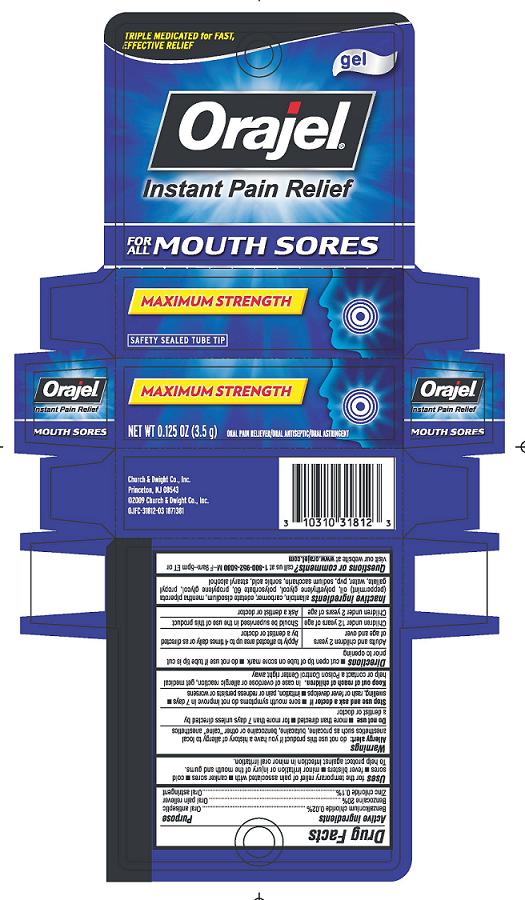Orajel Instant Pain Relief Maximum Strength | Benzocaine Gel while Breastfeeding

What is Orajel Instant Pain Relief Maximum Strength | Benzocaine Gel used for?
Brief: Purpose Oral antiseptic Oral pain reliever Pral astringent
Can I continue breastfeeding if I am using Orajel Instant Pain Relief Maximum Strength | Benzocaine Gel? How long does it stays in breast milk?

Orajel Instant Pain Relief Maximum Strength | Benzocaine Gel Breastfeeding Analsys
Benzocaine while Breastfeeding
SafeCAS Number: 94-09-7
At latest update, relevant published data on excretion into breast milk were not found. Topical anesthetics (intended for dermatological or oral use) when properly used, show limited systemic absorption which is practically nil, with nil or non-significant systemic levels in the plasma and breast milk. Benzocaine may induce appearance of methemoglobinemia and systemic toxicity if absorbed. Avoid use on the breast, otherwise, in case of use on the nipple, let it be done after a feed and wipe it out by thoroughly washing with water before the next feed. Do not apply creams, gels and other products that would contain paraffin (mineral oil) to avoid absorption by the infant since it is a hydrocarbon-derived substance.
Zinc chloride while Breastfeeding
SafeCAS Number: 7646-85-7
Zinc (Zn) is an essential element for nutrition. It is present in many foods.Recommended daily allowance of Zn is 8 to 15 mg. (Moran Hall 2010). Millions of people worldwide are Zn-deficient.It is used as a treatment for Wilson's disease and Acrodermatitis Enteropathica. Zn is involved in the regulation process of lactation (Lee 2016).Pasteurization of the milk does not affect the concentration of Zn and other trace elements (Mohd Taufek-2016). The average concentration of Zn in breastmilk is 4 to 16 mg / L (Picciano 1976, Hannan 2005, Dórea 2012) which is independent of plasma levels and maternal daily intake (Krebs 1995, Chierici 1999, Hannan 2009).Intestinal absorption of zinc is almost doubled during pregnancy and lactation (Fung 1997).Zinc levels in the infant are dependent on Zinc levels in the breast milk (Dumrongwongsiri 2015)With a varied and balanced diet, an extra intake of minerals is not needed. Excessive intake of Zinc may cause gastrointestinal problems and Pancytopenia (Irving 2003).
Orajel Instant Pain Relief Maximum Strength | Benzocaine Gel Breastfeeding Analsys - 2
Benzalkonium chloride while Breastfeeding
CAS Number: 8001-54-5
Topical maternal application of benzalkonium chloride or benzethonium chloride or their presence as a preservative in pharmaceuticals would not be expected to cause any adverse effects in breastfed infants.
Benzocaine while Breastfeeding
CAS Number: 94-09-7
Topical benzocaine has not been studied during breastfeeding, but is unlikely to affect her breastfed infant if it is applied away from the breast. Benzocaine should not be applied to the breast or nipple, because the infant may ingest the drug during nursing and it has been associated with severe methemoglobinemia.
Orajel Instant Pain Relief Maximum Strength | Benzocaine Gel Breastfeeding Analsys - 3
Benzalkonium chloride and Breastfeeding
SafeNote: Study and data for tropical use only
I am nursing mother and I have already used Orajel Instant Pain Relief Maximum Strength | Benzocaine Gel, what should I do?
Orajel Instant Pain Relief Maximum Strength | Benzocaine Gel is safe in breastfeeding and should not create any health problem for your baby but in case you feel any health issue associated with Orajel Instant Pain Relief Maximum Strength | Benzocaine Gel you should contact your doctor or health care provider. Be it pregnancy or lactation you shall keep your doctor informed.
My health care provider has asked me to use Orajel Instant Pain Relief Maximum Strength | Benzocaine Gel, what to do?
Definitely, Orajel Instant Pain Relief Maximum Strength | Benzocaine Gel is safe in lactation for baby. No wonder your doctor has recommended it.
If I am using Orajel Instant Pain Relief Maximum Strength | Benzocaine Gel, will my baby need extra monitoring?
No extra baby monitoring required while mother is using Orajel Instant Pain Relief Maximum Strength | Benzocaine Gel
Who can I talk to if I have questions about usage of Orajel Instant Pain Relief Maximum Strength | Benzocaine Gel in breastfeeding?
US
National Womens Health and Breastfeeding Helpline: 800-994-9662 (TDD 888-220-5446) 9 a.m. and 6 p.m. ET, Monday through Friday
UK
National Breastfeeding Helpline: 0300-100-0212 9.30am to 9.30pm, daily
Association of Breastfeeding Mothers: 0300-330-5453
La Leche League: 0345-120-2918
The Breastfeeding Network supporter line in Bengali and Sylheti: 0300-456-2421
National Childbirth Trust (NCT): 0300-330-0700
Australia
National Breastfeeding Helpline: 1800-686-268 24 hours a day, 7 days a week
Canada
Telehealth Ontario for breastfeeding: 1-866-797-0000 24 hours a day, 7 days a week
